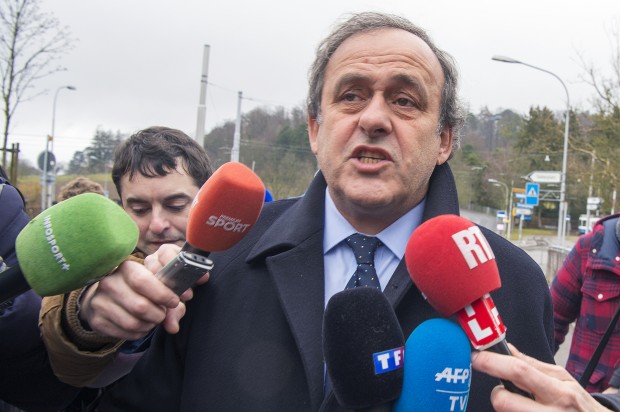Michel Platini fights at FIFA against his 8-year ban

Suspended UEFA President Michel Platini arrives at the FIFA Headquarters in Zurich, Switzerland, Monday, Feb. 15, 2016. Michel Platini’s appeal against his eight-year ban from all football-related activity will be heard by FIFA’s appeals committee today. (Walter Bieri/Keystone via AP)
ZURICH — Suspended UEFA President Michel Platini spent eight hours in an appeal case at FIFA headquarters on Monday, fighting his eight-year ban over a $2 million payment approved by Sepp Blatter.
Platini arrived relaxed for his fixture with the FIFA appeal committee by strolling from his nearby hotel into the main entrance.
After a long day with the lawyers in a “very good hearing,” the former FIFA presidential hopeful seemed at ease, emerging from his car into icy rain to conduct an impromptu news conference.
“I am rather happy with how it went. As for their interpretation, we’ll see how it goes,” said Platini, who denies wrongdoing. He is challenging sanctions imposed in December after a FIFA ethics committee hearing which he refused to attend, claiming his guilt was pre-judged.
“This time I was really listened to by people who are part of the football family, who know what the problems are,” Platini said, adding that a ruling could be given this week.
Still, the appeals panel chaired by Larry Mussenden — a former attorney general of Bermuda, who is seeking to become a FIFA vice president by winning the CONCACAF presidency in May — rarely overturns verdicts.
FIFA’s ethics committee found Platini guilty of accepting gifts, conflicts of interest and breaching loyalty and general conduct rules. He was fined 80,000 Swiss francs ($81,000).
Ethics judges said Platini’s argument was “not convincing” that a verbal contract entitled him to get uncontracted salary in 2011 for work as Blatter’s presidential adviser from 1999-2002.
Platini said most discussion Monday focused on the nature of the verbal deal with Blatter.
He sought to boost his case by presenting “important” evidence from two witnesses he brought: Angel Maria Villar, a FIFA and UEFA vice president from Spain who chairs the world body’s legal committee, and Jacques Lambert, a long-standing friend who heads the French organizing committee of the European Championship.
Blatter’s appeal of his eight-year ban is to be heard on Tuesday, just 10 days before the FIFA election congress he hopes to attend to see his successor chosen.
FIFA ethics prosecutors said they would lodge counter-appeals seeking life bans for both if bribery could be proved.
Both men can pursue further appeals at the Court of Arbitration for Sport if their bans are maintained.
“I don’t care if I’m politically finished in football,” Platini said. “I’m 60 years old, I’ve done a lot of things. I want to fight injustice.”
Platini’s hopes of following his one-time mentor Blatter into the FIFA top job were wrecked by the investigation into the $2 million payment.
It was first revealed by Switzerland’s attorney general last September, when Blatter and Platini were questioned at FIFA headquarters after an executive committee meeting. Criminal proceedings were opened against Blatter, and Platini was described as being “between a witness and an accused person.”
The salary deal also provoked a FIFA ethics case that stalled Platini’s application to be a presidential candidate.
Platini accepted last month that his legal problems would stop him from being cleared in time to properly contest the race.
“I hope I can start working again very soon and go back to the (UEFA) office,” he said. “And then prepare for the Euro. There are many important things to do and I haven’t worked in several months.”
UEFA has not appointed an interim president to perform Platini’s duties ahead of Euro 2016 that kicks off in June in France.
UEFA has also said it will not begin a new presidential election process until the Frenchman ends his legal fight.
Asked at the front gate if he had been inside FIFA’s home for the last time, Platini looked back into the darkness over his left shoulder and laughed with reporters.
“It’s possible. I don’t know at all,” he said.